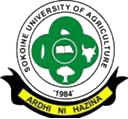
Professor Mark M. Rweyemamu
BVSc, PhD, FRCVS
Executive Director, SACIDS Foundation for One Health
Sokoine University of Agriculture, Morogoro, Tanzania.
Mark Rweyemamu is the Executive Director of the SACIDS Foundation for One Health[1] (SACIDS) at Sokoine University of Agriculture, Tanzania. He is a veterinarian and specialist in infectious diseases. He is a Visiting Professor at both Sokoine University in Tanzania and the Royal Veterinary College in London, UK. Previously, Mark had undertaken or led research work in governmental programmes in his home country, Tanzania, and thereafter inter-governmental organisations and in veterinary pharmaceutical industry. This provided him experience in Africa, South America and Europe, before joining the United Nations Food and Agriculture Organisation (FAO), where he led the infectious disease programme, as the inaugural Head of the FAO Emergency Programme for Transboundary Animal Diseases (EMPRES), including oversight of the Global Rinderpest Eradication Programme (GREP). He set up the normative strands that have now led to the Tripartite (FAO-WOAH-WHO) collaboration in Global Early Warning (GLEWS), Coordinated Response and Global Frameworks for transboundary (epidemic/pandemic) diseases, particularly, those with zoonotic potential. He is the current Chair of the FAO-WOAH Advisory Committee for the Global Eradication of Peste des Petits Ruminants. He has been on the Scientific Advisory Board of the World One Health Congresses since their inception till now, as we prepare for the 8th Congress to be held in Cape Town, 2024.
Mark’s research interest is infectious diseases, including antimicrobial resistance, through the One Health approach. The focus is on integrative systems based, multi-disciplinary approaches that enable to target the concept of Community Level One Health Security, through the detection and early identification disease or pathogens, particularly at source geographically, at community level, and zoologically at the animal-human interface. To address the burden of infectious diseases and antimicrobial resistance in Africa, SACIDS scientists are targeting competence in 3 domains, namely: (i) Genomics, (2) Digital and Data sciences/analytical epidemiology, and (3) social sciences. This is also reflected in the SACIDS approach to One Health research as a collaboration between the natural and social sciences.
Professor Rweyemamu is leading this transformation of SACIDS towards impact driven research and a resultant target interaction with policy at national and regional levels. In complement to the hypothesis-driven analytical research, SACIDS is also developing competence in implementation programmes to support national and regional authorities in the risk management of epidemics and antimicrobial resistance. A key example has been the SACIDS focus on developing infectious disease surveillance approaches and platforms. Core to this is the AfyaData platform constructed to be able to support public health or animal health national event-based and syndromic surveillance from community to national level leading to national, regional and international/global reporting. Already SACIDS is collaborating with the AfricaCDC regarding the African Union Frameworks for Event-Based Surveillance and for Antimicrobial and with the FAO to improve digital tools for disease surveillance in animals.
During the COVID-19 Pandemics, in East and Southern Africa, SACIDS Member institutions in Tanzania, Mozambique, Zambia and the Democratic Republic of Congo provided expertise, especially in surveillance, diagnostics, genomic sequencing, epidemiological and some sociological approaches to national authorities practically from the index cases right through as the pandemic evolved.
In Tanzania, SACIDS is collaborating with the Prime Minister’s Office based National One Health Coordination to set up an inter-sectoral One Health Digital Dashboard to facilitate early warning, early detection of disease event and other natural disaster events that might influence the spread of disease epidemics. This is creating national platform for early detection and response to epidemics as part of the National Disaster Emergency Management.
SACIDS Scientists are deploying new technologies and analytical capacity to collaborate with National, Regional and Africa-Continental Authorities to enhance their community to national infectious disease surveillance, prepare for the future and early warning for the next epidemic/pandemic.
[1] Formerly known as Southern African Centre for Infectious Diseases Surveillance







